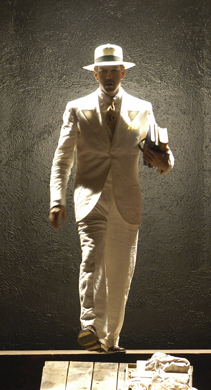
|
ANNA IN THE TROPICS
|
|
|
|
ANNA IN THE TROPICS
‘Anna’ in Dallas By Mark Lowry / Star-Telegram The Pulitzer-winning play about Cuban cigar makers shows how art inspires life Before Cuban cigar factories became mechanized in the 1930s, the owners hired lectors to read newspapers and books to the illiterate workers who hand-rolled cigars, to help pass the time. As one character in Nilo Cruz’s play Anna in the Tropics says, “some of us cigar workers might not be able to read or write, but we can recite lines from Don Quixote or Jane Eyre.” In preparing to write a play about these factory workers, Cruz considered novels by Emile Zola and Victor Hugo as launching points before deciding on Tolstoy’s Anna Karenina. Then his story began to parallel Tolstoy’s themes of adultery and jealousy. “It was by pure coincidence that that happened,” he says. “A lot of my writing is that way. I start discovering things as I go along, and I make connections. When this gentleman started reading from Anna Karenina, and I started to see how the characters were reacting to the book, a lot of scenes started to come up, and that’s how the play started taking shape.” It worked. After its premiere at the New Theatre in Coral Gables, Fla., and several other regional theaters, Anna in the Tropics received the 2003 Pulitzer Prize for drama. It was only the second play to win that award prior to being staged in New York. (The first was Robert Schenkkan’s The Kentucky Cycle in 1992.) The Broadway production came in fall 2003, starring Jimmy Smits, and, as often happens with Pulitzer winners, it’s now being done all over the country. It will appear at about 16 theaters during the 2004-05 season. Cruz is directing a production of it himself at Florida’s Coconut Grove Playhouse in October. Its first post-Broadway opening, however, is at the Dallas Theater Center, directed by Richard Hamburger. The production will then move on to Arizona Theater Company, followed by Pasadena Playhouse. For Hamburger, selecting Anna was a no-brainer. “I had been thinking of doing a Chekhov or a Lorca play,” he says. “And I think [Anna] lives someplace between Lorca and Chekhov, where everything doesn’t have to be literal.” And what started for Cruz as a script with characters he was passionate about is now considered a statement on art inspiring life. “I didn’t know in the beginning that I was dealing with such an important theme,” he says. “When I finished, I read it and thought, ‘I’ve written a play about the power of art and literature.’ “ |
|
© Richard Hamburger, Theater Director Site design and maintenance by Amy Lacy.
|



